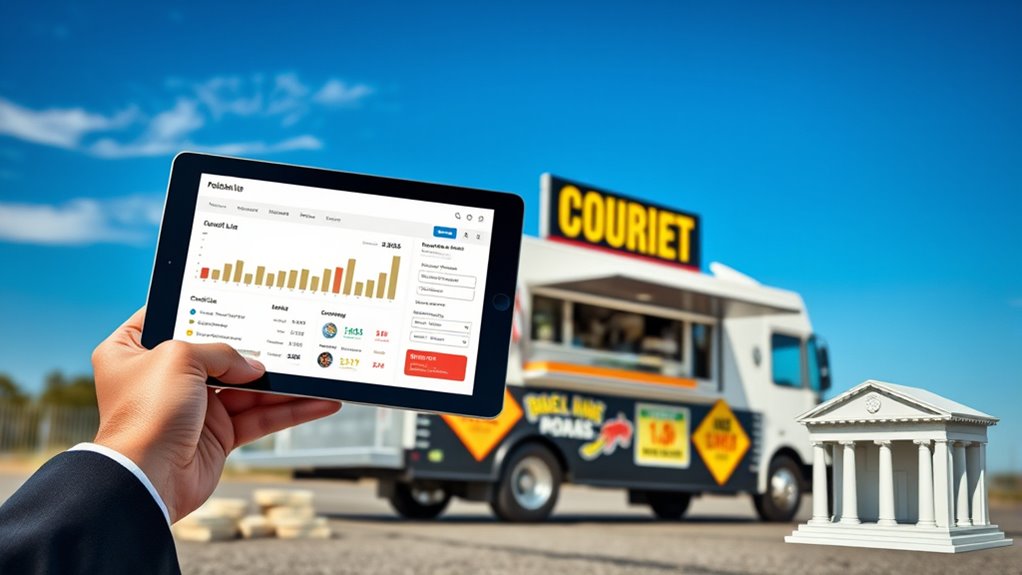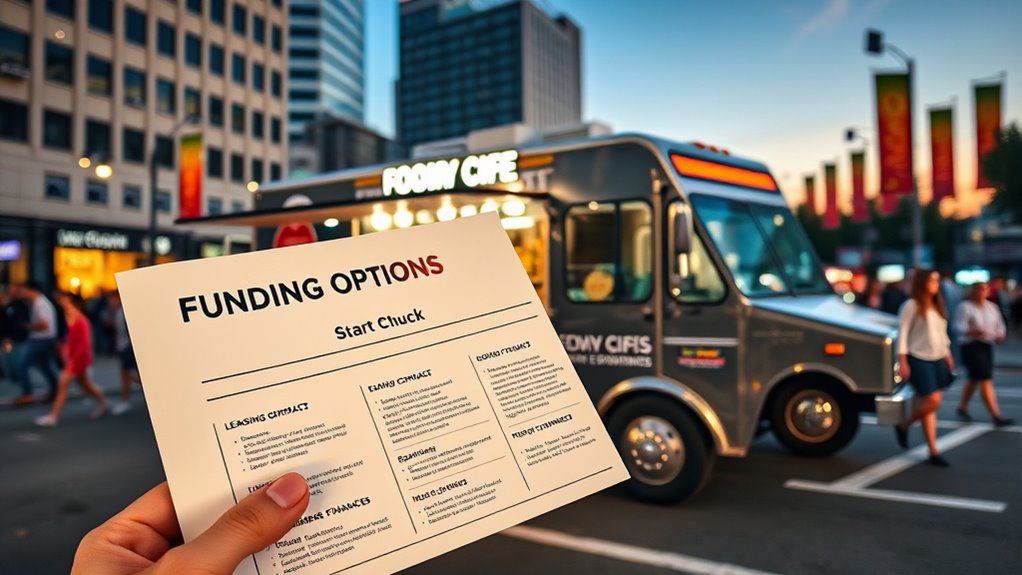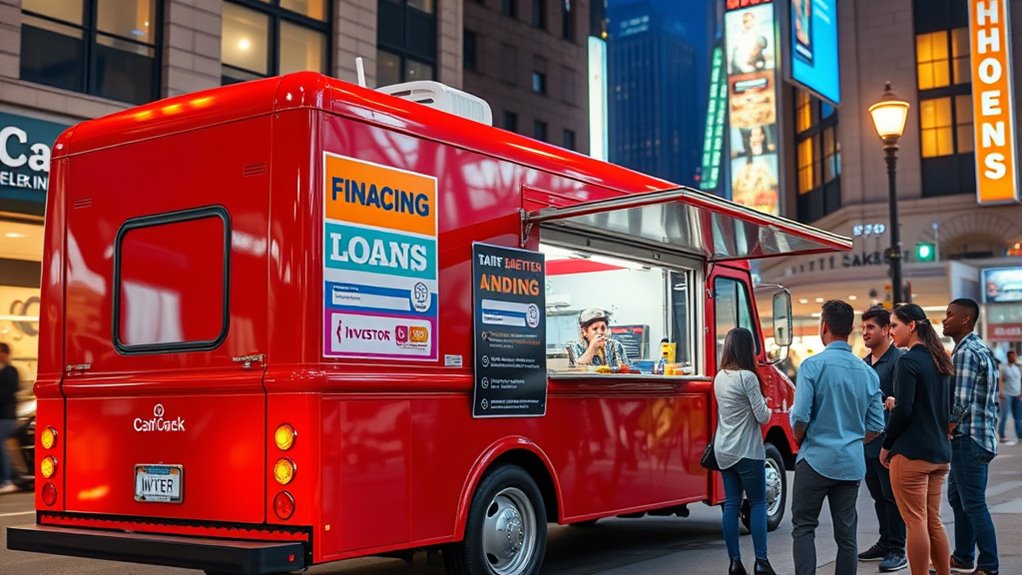To fund your food truck, you can tap into personal savings or seek support from family and friends. Explore traditional bank loans or credit lines if you have good credit, and consider grants or competitions geared toward small businesses. Microfinance institutions and community lenders may offer easier approval. You might also look into equipment leasing, partnerships, or crowdfunding for additional capital. Keep in mind, understanding all these options can help you choose the best path forward.
Key Takeaways
- Personal savings and family support can provide initial funding with full control and minimal debt.
- Traditional bank loans and credit lines offer structured financing but require good credit and collateral.
- Grants, microfinance, and community lenders offer alternative funding options with fewer eligibility barriers.
- Crowdfunding campaigns and equipment leasing help raise funds publicly and reduce upfront costs.
- Strategic partnerships and joint ventures allow shared resources, costs, and risk management for startup funding.
Personal Savings and Bootstrapping

Using your personal savings is often the most straightforward way to fund your food truck startup. It allows you to maintain full control without relying on lenders or investors. Bootstrapping strategies, such as cutting unnecessary expenses and prioritizing essential equipment, help stretch your savings further. You might also consider reallocating funds from other areas or delaying non-essential purchases until your business generates income. Additionally, focusing on cost-effective projectors can help you allocate funds more efficiently during the initial setup phase. Leveraging AI-powered data analytics can help identify where to best allocate your limited resources for maximum impact. Implementing creative financing options can also supplement your savings and provide additional capital when needed. By relying on personal savings, you avoid interest payments and debt, giving you more flexibility as you get started. Staying disciplined with your budget and diligently saving can turn your initial funds into a solid foundation for your food truck venture. Exploring cost-effective equipment and smart budgeting techniques can further enhance your financial strategy. Moreover, understanding the importance of financial planning can help you anticipate future expenses and avoid cash flow issues early on.
Bank Loans and Credit Lines

When considering bank loans or credit lines, you need to understand the eligibility requirements, like credit score and financial history. It’s also important to compare interest rates and terms to find the best fit for your budget. Additionally, understanding loan duration options can help you select a repayment plan that aligns with your financial goals. Being aware of trust issues and how they can impact borrowing decisions is also beneficial in planning your financial strategy. Knowing how comparative advantage influences the efficiency of resource allocation can also be beneficial in planning your financial strategy. Moreover, considering the potential impact of toilet maintenance costs on your overall expenses can help you better prepare your budget for unforeseen costs. Incorporating knowledge about water-related expenses can further aid in accurate financial planning. Finally, you’ll want to follow each step of the application process carefully to improve your chances of approval.
Loan Eligibility Requirements
To qualify for bank loans and credit lines, you’ll need to meet specific eligibility requirements that demonstrate your financial stability and ability to repay. A strong credit score is essential, as lenders use it to assess your reliability in handling debt. Typically, a score above 650 improves your chances of approval, but higher scores are preferred. You’ll also need to meet collateral requirements, which may include assets like savings, property, or equipment that can secure the loan. Providing collateral reduces the lender’s risk and increases your likelihood of approval. Be prepared to submit financial documents, such as tax returns and bank statements, to verify your ability to manage debt. Meeting these criteria shows lenders you’re a responsible borrower ready to handle the financial commitment. Additionally, understanding Gold IRA Rollovers can offer diversified investment options that might strengthen your overall financial position. Being aware of creditworthiness and how it impacts loan approval can help you better prepare your application. Maintaining a good credit history is also important as it reflects your past borrowing behavior and influences future lending decisions. Moreover, maintaining consistent financial habits can improve your loan eligibility over time, especially when combined with a thorough understanding of collateral requirements and how they affect approval chances.
Interest Rates and Terms
Interest rates and repayment terms are crucial factors that influence the overall cost of your financing, so it’s important to understand how they work. Higher interest rates increase your monthly payments and total repayment amount, while favorable terms can save you money. When considering bank loans or credit lines, look closely at how long you’ll be repaying and what interest rate you’ll be paying. Keep in mind:
- Fixed vs. variable interest rates
- Loan duration and its impact on monthly payments
- Penalties for early repayment
- How interest accrues over time
Understanding these elements helps you compare options effectively. A lower interest rate with flexible repayment terms can make financing more manageable and less costly for your new food truck venture. Additionally, being aware of the interest rate range for different lenders can help you make more informed decisions. Recognizing potential regulatory compliance challenges associated with financing can also prevent future complications. Moreover, understanding the types of interest you may encounter can help you choose the most favorable financing option. Being familiar with different lending methodologies can further assist in selecting the best financial product for your needs. Considering the traits of successful financing can also guide you toward more sustainable borrowing choices.
Application Process Steps
Getting your food truck financed through a bank loan or credit line involves several clear steps. First, you’ll need to prepare a solid business plan that highlights your menu customization ideas and food sourcing strategies. This plan should demonstrate how you’ll attract customers and manage costs effectively. Next, gather your financial documents, such as credit history, income statements, and a detailed budget. When applying, specify how the funds will be used for truck modifications, equipment, and initial supplies. The bank or lender will review your application, assess your creditworthiness, and evaluate your plans. Be prepared to answer questions about your menu choices, sourcing reliable ingredients, and your overall operation. Additionally, consider exploring specialized equipment options like custom planters to enhance your food truck’s aesthetic appeal. It is also beneficial to understand funding options that might be available outside traditional loans, such as grants or alternative financing methods. Reviewing your financial documentation thoroughly can help streamline the approval process. Properly understanding electricity production and energy needs for your truck can be crucial for operational efficiency. Once approved, review the terms carefully before signing to ensure the loan or credit line aligns with your business goals.
Small Business Grants and Competitions

Are small business grants and competitions worth exploring for your food truck startup? Absolutely. These opportunities can provide essential funding without the repayment stress. They often prioritize innovative concepts, so a strong food truck branding and creative menu design can boost your chances. Winning a competition or grant can also lend credibility, attracting customers and investors. To succeed, focus on crafting a compelling pitch that highlights your unique food truck concept and market potential. Keep in mind, many grants target specific demographics or communities, so research thoroughly. Participating in local or industry-specific competitions can also open doors to networking and mentorship. Overall, grants and competitions are valuable tools to fund your startup while sharpening your branding and menu strategy.
Microfinance Institutions and Community Lenders

Microfinance institutions often make loans more accessible to small entrepreneurs like you, even if you have limited credit history. Community lenders tend to support local food truck startups by offering personalized guidance and flexible terms. Their support can be a vital resource as you seek funding to launch your food truck business.
Microfinance Loan Accessibility
Accessing microfinance loans can be a practical way to fund your food truck startup, especially if traditional banks turn you down. Microfinance accessibility makes it easier for entrepreneurs like you to secure funding through specialized lenders focused on small-scale food truck financing. These lenders often have relaxed requirements and quicker approval processes, helping you get your business off the ground faster. To improve your chances, consider these factors:
- Your credit history and how microfinance institutions view it
- The specific documentation needed for microfinance applications
- The interest rates and repayment terms offered
- How microfinance loans compare to other funding options in terms of flexibility and cost
Understanding these aspects can help you navigate the process more effectively and secure the funding needed to launch your food truck.
Community Lenders’ Support
Community lenders, including microfinance institutions and local community banks, often provide tailored support for food truck entrepreneurs who need flexible funding options. These community lenders understand the unique challenges of starting a food truck business and can offer more personalized terms compared to traditional banks. They’re a valuable resource for securing local funding, especially if you have limited collateral or credit history. Community lenders typically focus on supporting local economic growth, making them more willing to work with small business owners like you. Their loans often come with lower interest rates and more accommodating repayment schedules. By tapping into community lenders, you gain access to essential capital that aligns with your specific needs, helping you launch and grow your food truck successfully.
Investor Funding and Angel Investors

Are you contemplating ways to fund your food truck without relying solely on personal savings? Investor funding, especially from angel investors, can be a smart choice. Angel investors often invest during early funding stages, helping turn your concept into reality. They bring more than money—they offer expertise and valuable connections. To attract angel investors, you’ll need a solid business plan and clear growth potential. Keep in mind, funding stages matter; initial investments focus on startup costs, while later rounds support expansion. Here are some key points to consider:
Angel investors can fund your food truck startup and provide valuable expertise and connections.
- Building relationships with potential investors
- Demonstrating a profitable business model
- Preparing a compelling pitch
- Understanding investor expectations and terms
Crowdfunding Campaigns

Crowdfunding campaigns have become a popular way to raise funds for starting a food truck by reaching a broad audience online. With a compelling pitch, you can showcase your food truck menu and plans for success, attracting donors interested in supporting local cuisine. Successful campaigns often highlight your understanding of city permits and regulations, reassuring backers you’re prepared. To stand out, create engaging videos and clear goals. Here’s an example of how you can structure your campaign:
| Aspect | Details |
|---|---|
| Food truck menu | Unique dishes that appeal to your target market |
| City permits | Demonstrate your knowledge of local requirements |
| Funding goal | Specific amount needed to launch |
| Campaign timeline | Duration of your crowdfunding effort |
| Rewards | Incentives for backers, like free meals or merchandise |
Equipment Financing and Leasing

Leasing equipment can save you upfront costs, but it’s important to guarantee the benefits and potential drawbacks. You should also explore loan options to find the best fit for your needs. Choosing the right financing partner helps ensure smooth equipment acquisition and long-term success.
Leasing Benefits and Drawbacks
While leasing equipment can lower your upfront costs and preserve cash flow, it also comes with certain trade-offs you should consider. The leasing benefits include reduced initial expenses and easier upgrades, allowing you to keep your truck modern and efficient. However, leasing drawbacks involve potential long-term costs and limited ownership rights. You might pay more over time compared to buying outright, and you’ll need to meet lease terms to avoid penalties. Additionally, leasing agreements may restrict customization options and include mileage or usage limits that don’t align with your business needs. Carefully weigh these factors to determine if leasing suits your food truck startup. Understanding both leasing benefits and drawbacks helps you make an informed decision aligned with your financial strategy.
Equipment Loan Options
When it comes to funding your food truck, equipment loans like financing and leasing offer flexible options to acquire necessary gear without draining your cash reserves. These options enable you to invest in essential equipment that supports food safety standards and efficient menu planning. With equipment financing, you can spread payments over time, making it easier to manage cash flow while upgrading or expanding your kitchen tools. Leasing provides a low upfront cost and allows you to access the latest equipment without long-term commitments. Both options help you stay compliant with food safety regulations by ensuring you have reliable appliances and tools. This flexibility allows you to prioritize quality and safety, ultimately supporting your success on the road.
Choosing the Right Partner
Choosing the right partner for your equipment financing or leasing is essential to securing favorable terms and reliable support. Your partner’s selection impacts not only costs but also your ability to operate smoothly. To make an informed choice, consider collaboration strategies that foster transparency and ongoing communication. Look for lenders or leasing companies with a solid reputation, flexible repayment options, and a clear understanding of the food truck industry. Establishing a strong partnership can help you navigate unexpected challenges and negotiate better deals. Keep these factors in mind during partner selection:
- Experience working with food truck startups
- Transparent fee structures and interest rates
- Flexibility in lease or loan terms
- Responsive customer support and ongoing relationship management
Partnerships and Joint Ventures

Are partnerships and joint ventures worthwhile options for funding your food truck? They can be effective if you establish clear partnership agreements and strategize joint ventures carefully. These approaches allow shared resources, risk, and expertise, reducing your upfront investment. Visualize your options:
| Partnership Agreements | Joint Venture Strategies | Shared Benefits |
|---|---|---|
| Formal contracts | Co-owning trucks | Cost savings |
| Clear roles | Marketing collaborations | Increased reach |
| Profit sharing | Menu development | Broader network |
Family and Friends Support

Leveraging support from family and friends can be a practical way to fund your food truck without the complexities of formal partnerships. Family support and friend contributions often come with lower or no interest, making them an attractive option. You might receive direct loans, gifts, or investments that help cover initial costs like equipment, permits, and ingredients. To guarantee clarity, it’s wise to set clear expectations and repayment terms upfront. Building trust and maintaining open communication can prevent misunderstandings. Remember, these contributions are not just financial; emotional backing can also motivate you through challenging times.
- Establish clear repayment plans for family loans
- Consider gifts as non-repayable support
- Use informal agreements to avoid legal complications
- Keep friends and family updated on your progress
Industry-Specific Funding Programs

Looking for targeted funding options tailored specifically for food trucks? Industry-specific funding programs can be a great fit. These programs often understand the unique needs of food trucks, including menu customization and compliance with health regulations. Some grants and loans are designed to support small food businesses, offering funds for equipment, permits, and setup costs. Additionally, certain local government initiatives focus on promoting food truck entrepreneurship by providing financial assistance or low-interest loans. These programs may also help you navigate health regulations more effectively, ensuring your truck meets all safety standards. By leveraging industry-specific funding, you can access resources that align with your business goals, making it easier to launch and grow your food truck while staying compliant with industry requirements.
Frequently Asked Questions
What Are the Legal Requirements for Starting a Food Truck Business?
You need to meet specific legal requirements to start your food truck business. First, make certain you comply with food safety regulations to keep your customers safe. Next, obtain proper vehicle licensing, which includes registering your truck and securing necessary permits. You might also need health department inspections and a business license. Staying compliant with local laws helps you avoid fines and legal issues, ensuring a smooth start for your food truck venture.
How Can I Estimate the Total Startup Costs for a Food Truck?
Did you know the average food truck startup costs range from $50,000 to $150,000? To estimate your total startup costs, start with cost estimation for equipment, permits, and initial inventory. Then, factor in expenses like licensing, marketing, and vehicle customization. Use detailed budget planning to identify fixed and variable costs, helping you create a realistic financial plan and avoid surprises, ensuring your food truck gets off to a strong start.
Are There Specific Permits Needed for Mobile Food Vendors?
You’ll need specific permits to operate legally as a mobile food vendor. Obtain mobile vendor permits and food truck licenses from your local health department and city or county authorities. These permits guarantee your truck meets health and safety standards. Check if you need additional licenses, such as a business license or parking permits. Securing these documents before hitting the road keeps your food truck business compliant and allows smooth operations.
What Are Common Challenges Faced When Securing Food Truck Funding?
When you seek food truck funding, you’ll likely face common challenges like financing pitfalls and funding obstacles. Lenders may hesitate due to the mobile nature of your business or limited credit history, making it hard to secure loans. You might also encounter high-interest rates or strict requirements. Staying prepared and understanding these hurdles helps you develop strategies to overcome them, ensuring you get the necessary funds to launch and grow your food truck.
How Does Credit History Impact Funding Eligibility for Food Trucks?
Did you know that a good credit score increases your chances of loan approval by 50%? Your credit score is vital because lenders use it to assess your financial reliability. A strong credit history shows you’re responsible, making it easier to secure funding for your food truck. Conversely, a poor credit score can hinder loan approval, so improving your credit can greatly boost your funding prospects.
Conclusion
When you’re ready to roll, remember that funding fosters freedom and flexibility. By exploring options like personal pockets, partnerships, and industry programs, you’ll build a bold base for your food truck dream. Don’t delay—delve into diverse dollars, develop your dough, and drive your culinary venture forward. With wise work, willing wallets, and a little wit, you’ll win the wheels and wow your world. Your food truck future is just a funding find away!









